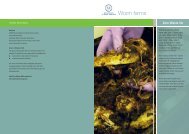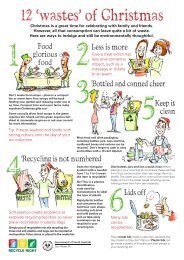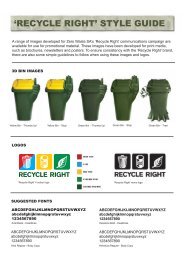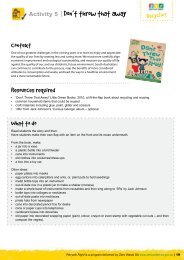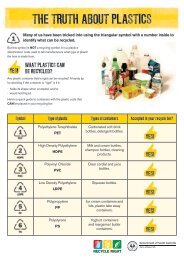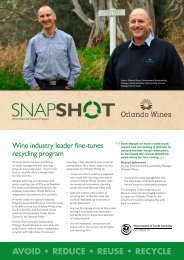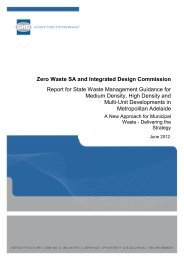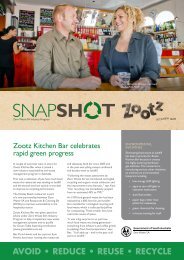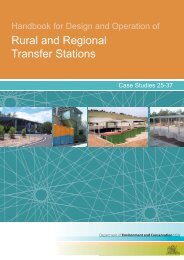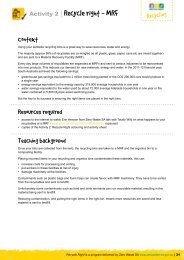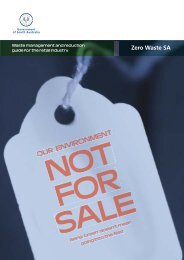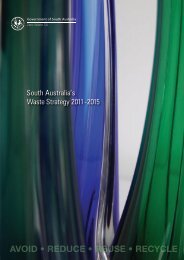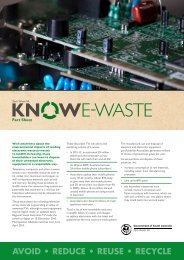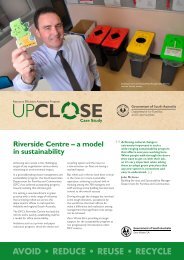Annual Report 2010-11 - Zero Waste SA - SA.Gov.au
Annual Report 2010-11 - Zero Waste SA - SA.Gov.au
Annual Report 2010-11 - Zero Waste SA - SA.Gov.au
You also want an ePaper? Increase the reach of your titles
YUMPU automatically turns print PDFs into web optimized ePapers that Google loves.
16<br />
The new recycling facility is fully undercover, utilises<br />
state-of-the-art sorting and recovery equipment, and<br />
will significantly increase resource recovery capacity<br />
Peats Soils and Composting ($175,000) – Kerbside<br />
screening project<br />
Peats Soils and Composting will purchase screening<br />
equipment to sort and remove contaminants from<br />
kerbside-collected organic waste, such as metals and<br />
plastics, which is processed into compost. Current methods<br />
of contaminant removal based on manual picking and<br />
mechanical screening are not adequately keeping pace<br />
with operational requirements. The processing and<br />
production of consistent and reliable product from organic<br />
material is essential for continuing to support and grow<br />
consumer confidence in the recycled product. Peats is<br />
contributing an additional $175,000 to this project.<br />
Solo Resource Recovery ($300,000) – Adelaide <strong>Waste</strong><br />
and Recycling Centre redevelopment<br />
This project will significantly expand and upgrade the<br />
facilities and waste receiving capability at Solo Resource<br />
Recovery’s Adelaide <strong>Waste</strong> and Recycling Centre in North<br />
Plympton. This upgrade includes improving public access to<br />
the site for a range of resource recovery streams including<br />
e-waste, hazardous waste, mixed dry recyclables and<br />
organics, and construction of a large permanently covered<br />
area for organics (including food). The project aims to<br />
increase diversion from landfill by 40%, or 2,000 tonnes<br />
per week. Solo Resource Recovery is contributing an<br />
additional $1,700,000 to this project.<br />
Progress on previously awarded projects<br />
Integrated <strong>Waste</strong> Services – commercial and industrial<br />
materials recovery and sorting equipment ($300,000)<br />
Integrated <strong>Waste</strong> Services l<strong>au</strong>nched a new $4 million<br />
purpose built recycling centre in Wingfield in early<br />
September <strong>2010</strong>. <strong>Zero</strong> <strong>Waste</strong> <strong>SA</strong> and the Australian<br />
Packaging Covenant contributed to the facility through<br />
a grant of $300,000 ($150,000 from each agency) for the<br />
installation of high-quality commercial and industrial<br />
materials recovery and sorting equipment expected to<br />
divert an additional 100,000 tonnes from landfill. The new<br />
recycling facility is fully undercover, utilises state-of-theart<br />
sorting and recovery equipment, and will significantly<br />
increase resource recovery capacity, therefore preventing<br />
huge tonnages of resources being sent to landfill.<br />
Integrated <strong>Waste</strong> Services spent $3.7 million on the new<br />
recycling facility.<br />
<strong>SA</strong> <strong>Waste</strong> Management – mixed waste resource recovery<br />
facility ($175,000)<br />
<strong>SA</strong> <strong>Waste</strong> Management has invested in resource<br />
recovery infrastructure to dramatically improve sorting<br />
and processing efficiency at <strong>SA</strong> <strong>Waste</strong> Management’s<br />
transfer station. The station became operational in<br />
November <strong>2010</strong> and was expected to divert 3,000 tonnes<br />
of mixed waste materials from landfill each year. Early<br />
performance reports indicate that diversion of materials<br />
from this facility has exceeded this expectation. <strong>SA</strong> <strong>Waste</strong><br />
Management’s contribution to the project is expected to<br />
be around $440,000.<br />
Regional Implementation<br />
Program<br />
The <strong>Zero</strong> <strong>Waste</strong> <strong>SA</strong> Regional Implementation Program<br />
supports regional government to reform processes and<br />
improve recovery of materials.<br />
Regional areas, where population densities are low,<br />
generate 20% of South Australia’s waste. It is often<br />
difficult and complex to deliver waste and recycling<br />
services in these locations. <strong>Zero</strong> <strong>Waste</strong> <strong>SA</strong> has supported<br />
regional waste management strategies. As these are<br />
completed, <strong>Zero</strong> <strong>Waste</strong> <strong>SA</strong> offers grants to support up to<br />
50% of the implementation costs.<br />
The Regional Implementation Program was reviewed in<br />
2009 10, to gather feedback from stakeholders on barriers<br />
experienced, identify opportunities for improvement<br />
and g<strong>au</strong>ge future demand. Key recommendations were<br />
incorporated into the <strong>2010</strong>–<strong>11</strong> funding round of the<br />
Regional Implementation Program.



